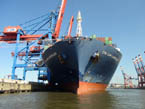Understanding Import Shipping Fees
Importing goods by sea involves paying shipping fees, which can significantly impact the overall cost of your cargo. These fees are determined by various factors, including the type of vessel, route, and cargo details. Understanding how shipping costs are calculated is essential for optimizing your logistics and budgeting.
Factors Affecting Shipping Fees
The primary cost components include vessel hire, fuel expenses, cargo handling charges, and taxes. Vessel hire depends on the ship's size and route duration. Fuel costs fluctuate with global oil prices, making them a variable expense. Cargo handling fees vary based on weight, volume, and packaging requirements. Taxes and duties are additional charges depending on import regulations.
Calculating Shipping Costs
To calculate shipping fees, you need to consider the weight and volume of your cargo, the distance and route chosen, and the vessel's capacity. Using online tools or software can help estimate these costs accurately. It's also crucial to factor in potential delays or route changes, which can increase expenses.
Importance of Efficient Logistics
Optimizing your shipping process can reduce costs and improve delivery times. By selecting the right vessel and route, you can minimize fuel consumption and handling fees. Proper documentation and timely payments also contribute to smoother operations and lower overall expenses.
In conclusion, understanding and calculating import shipping fees is crucial for efficient logistics management. By considering all cost factors and optimizing your shipping strategy, you can significantly reduce your cargo costs and enhance your supply chain efficiency.
